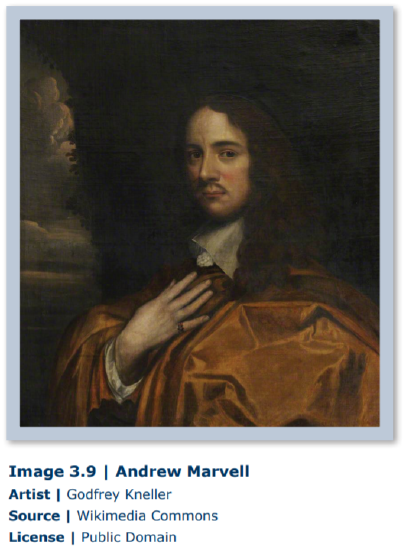3.3: Andrew Marvell (1621-1678)
- Page ID
- 168423
Andrew Marvell’s father, the Reverend Andrew Marvell, died from drowning after a boating accident, thereby possibly curtailing Marvell’s academic career and possibly leading to his taking religious orders. Marvell probably studied at the Hull Grammar School; at the age of twelve, he entered Trinity College, Cambridge, where he earned his B.A. in four years, then began studying for a Master of Art (which he did not complete).
He may have traveled the Continent during the Civil War. He secured a position as tutor to the daughter of Lord Thomas Fairfax (1612-1671), a Parliamentarian general. Marvell’s Parliamentarian sympathies may have won him his subsequent positions, as tutor to William Dutton, the ward of Oliver Cromwell; as Latin Secretary, assisting John Milton in translations and diplomatic correspondence; and as Minister of Parliament, a position Marvell held until his death but that began before the Restoration. As a politician, Marvell seems to have promoted the interests of religious and political dissenters, though he did not actively oppose the Restoration. He may have saved Milton’s life after the Restoration, a time of reprisal when many “rebels” were executed. His poem “On Mr. Milton’s Paradise Lost,” praises Milton’s genius at a time when Milton was exiled for his political activities.
 Scholars have sometimes divided Marvell’s work into pre- and post-Restoration, with most of his poetry being placed pre- and most of his prose, particularly his political writing, being placed post-Restoration. All of his writing is characterized by its intellect, wit, and often abstruse logic. John Dryden noted Marvell’s tendency towards the abstract, especially when dealing with emotional subjects. In the twentieth century, T. S. Eliot (1888-1965) linked Marvell with the metaphysical poets in their uniting reason and emotion. Like that of other metaphysical poets, such as John Donne’s, Marvell’s poetry uses puns, paradoxes, and incongruous images. What seems unique to Marvell is his willingness to maintain ambiguity, to give all sides of a subject their due, to complicate rather than simplify. In “To His Coy Mistress,” he can adore his mistress’s eyes, forehead, and “the rest” (16) yet still roll all her sweetness and strength into “one ball” (42).
Scholars have sometimes divided Marvell’s work into pre- and post-Restoration, with most of his poetry being placed pre- and most of his prose, particularly his political writing, being placed post-Restoration. All of his writing is characterized by its intellect, wit, and often abstruse logic. John Dryden noted Marvell’s tendency towards the abstract, especially when dealing with emotional subjects. In the twentieth century, T. S. Eliot (1888-1965) linked Marvell with the metaphysical poets in their uniting reason and emotion. Like that of other metaphysical poets, such as John Donne’s, Marvell’s poetry uses puns, paradoxes, and incongruous images. What seems unique to Marvell is his willingness to maintain ambiguity, to give all sides of a subject their due, to complicate rather than simplify. In “To His Coy Mistress,” he can adore his mistress’s eyes, forehead, and “the rest” (16) yet still roll all her sweetness and strength into “one ball” (42).
3.8.1: “A Dialogue, Between The Resolved Soul, and Created Pleasure”
(1681)
Courage my Soul, now learn to wield
The weight of thine immortal Shield.
Close on thy Head thy Helmet bright.
Ballance thy Sword against the Fight.
See where an Army, strong as fair,
With silken Banners spreads the air.
Now, if thou bee’st that thing Divine,
In this day’s Combat let it shine:
And shew that Nature wants an Art
To conquer one resolved Heart.
Pleasure.
Welcome the Creations Guest,
Lord of Earth, and Heavens Heir.
Lay aside that Warlike Crest,
And of Nature’s banquet share:
Where the Souls of fruits and flow’rs
Stand prepar’d to heighten yours.
Soul.
I sup above, and cannot stay
To bait so long upon the way.
Pleasure.
On these downy Pillows lye,
Whose soft Plumes will thither fly:
On these Roses strow’d so plain
Lest one Leaf thy Side should strain.
Soul.
My gentler Rest is on a Thought,
Conscious of doing what I ought.
Pleasure.
If thou bee’st with Perfumes pleas’d,
Such as oft the Gods appeas’d,
Thou in fragrant Clouds shalt show
Like another God below.
Soul.
A Soul that knowes not to presume
Is Heaven’s and its own perfume.
Pleasure.
Every thing does seem to vie
Which should first attract thine Eye:
But since none deserves that grace,
In this Crystal view thy face.
Soul.
When the Creator’s skill is priz’d,
The rest is all but Earth disguis’d.
Pleasure.
Heark how Musick then prepares
For thy Stay these charming Aires;
Which the posting Winds recall,
And suspend the Rivers Fall.
Soul.
Had I but any time to lose,
On this I would it all dispose.
Cease Tempter. None can chain a mind
Whom this sweet Chordage cannot bind.
Chorus.
Earth cannot shew so brave a Sight
As when a single Soul does fence
The Batteries of alluring Sense,
And Heaven views it with delight.
Then persevere: for still new Charges sound:
And if thou overcom’st thou shalt be crown’d.
Pleasure.
All this fair, and cost, and sweet,
Which scatteringly doth shine,
Shall within one Beauty meet,
And she be only thine.
Soul.
If things of Sight such Heavens be,
What Heavens are those we cannot see?
Pleasure.
Where so e’re thy Foot shall go
The minted Gold shall lie;
Till thou purchase all below,
And want new Worlds to buy.
Soul.
Wer’t not a price who’ld value Gold?
And that’s worth nought that can be sold.
Pleasure.
Wilt thou all the Glory have
That War or Peace commend?
Half the World shall be thy Slave
The other half thy Friend.
Soul.
What Friends, if to my self untrue?
What Slaves, unless I captive you?
Pleasure.
Thou shalt know each hidden Cause;
And see the future Time:
Try what depth the Centre draws;
And then to Heaven climb.
Soul.
None thither mounts by the degree
Of Knowledge, but Humility.
Chorus.
Triumph, triumph, victorious Soul;
The World has not one Pleasure more:
The rest does lie beyond the Pole,
And is thine everlasting Store.
3.8.2 “On a Drop of Dew”
(1681)
See how the Orient Dew,
Shed from the Bosom of the Morn
Into the blowing Roses,
Yet careless of its Mansion new;
For the clear Region where ’twas born
Round in its self incloses:
And in its little Globes Extent,
Frames as it can its native Element.
How it the purple flow’r does slight,
Scarce touching where it lyes,
But gazing back upon the Skies,
Shines with a mournful Light;
Like its own Tear,
Because so long divided from the Sphear.
Restless it roules and unsecure,
Trembling lest it grow impure:
Till the warm Sun pitty it’s Pain,
And to the Skies exhale it back again.
So the Soul, that Drop, that Ray
Of the clear Fountain of Eternal Day,
Could it within the humane flow’r be seen,
Remembring still its former height,
Shuns the sweat leaves and blossoms green;
And, recollecting its own Light,
Does, in its pure and circling thoughts, express
The greater Heaven in an Heaven less.
In how coy a Figure wound,
Every way it turns away:
So the World excluding round,
Yet receiving in the Day.
Dark beneath, but bright above:
Here disdaining, there in Love.
How loose and easie hence to go:
How girt and ready to ascend.
Moving but on a point below,
It all about does upwards bend.
Such did the Manna’s sacred Dew destil;
White, and intire, though congeal’d and chill.
Congeal’d on Earth: but does, dissolving, run
Into the Glories of th’ Almighty Sun.
3.8.3: “The Coronet”
(1681)
When for the Thorns with which I long, too
With many a piercing wound, (long,
My Saviours head have crown’d,
I seek with Garlands to redress that Wrong:
Through every Garden, every Mead,
I gather flow’rs (my fruits are only flow’rs)
Dismantling all the fragrant Towers
That once adorn’d my Shepherdesses head.
And now when I have summ’d up all my store,
Thinking (so I my self deceive)
So rich a Chaplet thence to weave
As never yet the king of Glory wore:
Alas I find the Serpent old
That, twining in his speckled breast,
About the flow’rs disguis’d does fold,
With wreaths of Fame and Interest.
Ah, foolish Man, that would’st debase with them,
And mortal Glory, Heavens Diadem!
But thou who only could’st the Serpent tame,
Either his slipp’ry knots at once untie,
And disintangle all his winding Snare:
Or shatter too with him my curious frame:
And let these wither, so that he may die,
Though set with Skill and chosen out with Care.
That they, while Thou on both their Spoils dost tread,
May crown thy Feet, that could not crown thy Head.
3.8.4: “To his Coy Mistress”
(1681)
Had we but World enough, and Time,
This coyness Lady were no crime.
We would sit down, and think which way
To walk, and pass our long Loves Day.
Thou by the Indian Ganges side
Should’st Rubies find: I by the Tide
Of Humber would complain. I would
Love you ten years before the Flood:
And you should if you please refuse
Till the Conversion of the Jews.
My vegetable Love should grow
Vaster then Empires, and more slow.
An hundred years should go to praise
Thine Eyes, and on thy Forehead Gaze.
Two hundred to adore each Breast:
But thirty thousand to the rest.
An Age at least to every part,
And the last Age should show your Heart.
For Lady you deserve this State;
Nor would I love at lower rate.
But at my back I alwaies hear
Times winged Charriot hurrying near:
And yonder all before us lye
Desarts of vast Eternity.
Thy Beauty shall no more be found;
Nor, in thy marble Vault, shall sound
My ecchoing Song: then Worms shall try
That long preserv’d Virginity:
And your quaint Honour turn to durst:
And into ashes all my Lust.
The Grave’s a fine and private place,
But none I think do there embrace.
Now therefore, while the youthful hew
Sits on thy skin like morning grew,
And while thy willing Soul transpires
At every pore with instant Fires,
Now let us sport us while we may;
And now, like am’rous birds of prey,
Rather at once our Time dev out,
Than languish in his slow chapt pow’r.
Let us roll all our Strength, and all
Our sweetness, up into one Ball
And tear our Pleasures with rough strife,
Thorough the Iron gates of Life.
Thus, though we cannot make our Sun
Stand still, yet we will make him run.


